#the Austrian Empire was crumbling
Explore tagged Tumblr posts
Text
SLOVENIAN CUISINE: EXPLAINED
Extremely confused by Joker Out’s recent post? Don’t worry, we’ve got you covered!

KRANJSKA KLOBASA:

Carniolan sausage is one of the most recognisable Slovenian culinary products. Since January 2015 it has been protected with geographical indication by the European Union. It originates from the historical region of Kranjska, once the Duchy of Carniola, a crown land of the Austrian Empire. The sausage is a reddish brown colour on the surface and bears a faint scent of smoke. Each pair is held together with a wooden skewer.
Preparation: It contains at least 75 to 80% pork (aside from bacon) and at most, 20% bacon. It may contain up to 5% water, sea salt from the Sečovlje salt pans, a little garlic, saltpetre and black pepper. No other ingredients are permitted. It has to be cooked before consumption. It is usually eaten hot, together with sour or cooked cabbage or sour turnip.
Perfect for: folk village parties called ‘veselice’, where they are a common choice alongside wine or beer. For that occasion, bread, mustard, and sliced onion are mandatory accompaniments.
IDRIJSKI ŽLIKROFI:

Žlikrofi is a traditional Slovenian dish, originating from Idrija a small town in the east of Slovenia. Idrija is mostly known for its lace and now-closed mercury mines. Žlikrofi were the first Slovenian dish registered as a Traditional speciality guaranteed (TSG).
Preparation: Žlikrofi are made using pasta, filled with a mixture of potatoes, onion, pig lard, chives and other spices. They are best served with ‘bakalca’ (a sauce made out of lamb and vegetables).
Perfect for: Žlikrofi are eaten all year round and can be served either as a starter, side dish or a main course. Alongside restaurants in Idrija, tourists can also try them at the Idrija Lace Festival or at the Idrija Žlikrofi Festival, where žlikrofi are prepared in more than 35 different ways. The žlikrofi festival is held at the end of August, this year it is taking place on the 24th of August.
POTICA:

Potica (a Slovenian nut roll) is the number one traditional holiday pastry in Slovenia. It has been registered as a Traditional speciality guaranteed (TSG) in the European Union since April 2021.
Preparation: It consists of a rolled pastry made from sweet yeast dough, most commonly filled with walnuts, but there are variations with hazelnuts, tarragon, poppy, cottage cheese and others. Its ingredients are quite basic, but achieving the right balance of filling and dough is challenging. Traditionally it is ring-shaped, baked always in the special shaped potica baking mould (ceramic, glass or tin one), called ‘potičnik’, which has a conical protrusion in the middle.
Perfect for: All holidays, especially Christmas and Easter. Slovenian housekeepers are happy to bake it even outside the holiday season to pamper their loved ones.
PREKMURKSA GIBANICA:

Prekmurje layer cake (literal translation: Over-Mura moving cake 😂) is a special cake originating in eastern region of Slovenia, Prekmurje. The name ‘gibanica’ comes from the dialect expression güba and refers to a fold. Since March 2010, prekmurska gibanica is protected in the EU as a Traditional Speciality Guaranteed.
Fun fact: If you are visiting Prekmurje, you can swing by The House of Gibanica, where you can enjoy the full gibanica experience which includes tasting handmade gibanica, made in the traditional way using a protected recipe.
Preparation: The preparation of this layered cake is quite complex and expensive, which is why it is only served on special occasions. Each layer is topped with plenty of sweet cream, eggs and butter. The dessert requires crumbly and rolled dough and four types of filling, made up of cottage cheese, poppy seeds, walnuts and apples.
Perfect for: special occasions like Christmas and Easter. As it is very filling, it’s not ideal to eat (or prepare) in hot weather.
BOGRAČ

Bograč is a hearty dish, consisting of many meats. It is typical of the Prekmurje region. It is a festive dish, as it is never cooked for just one person. It is best when cooked in a kettle over an open fire. In Hungarian this kettle is called 'bogrács' , hence the name of the dish.
Preparation: Sweat onions in lard, then add a different type of meat to the dish at the end of each hour of simmering: first the beef, then the venison, and finally the pork. Season with paprika and add a splash of white wine. Finally, add the potatoes and cook until they are done.
Perfect for: large family gatherings.
Fun fact: Every year, Lendava* organises the international 'bograč' cooking competition called ‘Bogračfest.’ The municipality of Lendava also holds the Guinness World Record for the largest bograč ever prepared (1,801 kg) since 2021.
* A Slovenian town near the Hungarian border.
Content prepared by: @kurooscoffee, @weolucbasu, drumbeat
Graphic design by: X pastellibianchi, anonymous JOS member
English proofreading by: IG GBoleyn123, @flowerlotus8, X klamstrakur
#joker out#jokeroutsubs#slovenian cuisine#slovenian dishes#i feel slovenia#ifeelslovenia#jos: masterpost#slovenian culture
94 notes
·
View notes
Text

Some of the 14,576 soldiers of the famed 44th Infantry Division wave and cheer as the liner Queen Elizabeth, which brought them home from Europe, ties up at a dock, July 20, 1945. It was the 44th Division that battled its way across France to the Austrian heart of the now-crumbled Nazi empire.
Photo: Anthony Camerano for the AP
#vintage New York#1940s#Anthony Camerano#World War II#RMS Queen Elizabeth#July 20#homecoming#20 July#44th Infantry Division#returning veterans#vintage NYC
66 notes
·
View notes
Note
Hi! I found your blog just recently and I love the Vesnaposting - the art, the comics, the gifs from the game, all of it. I've got so many questions:
How did you got yourself interested in this time period? Why Bohemia? Where exactly could the castle be found? Do you plan to connect your story with some "greater events" from that time? Will your OCs travel a bit?
Please, continue with all of this. It looks great and I would also love to play the game one day!
Thank you very much for the questions! I love getting intricate and thought out things to answer, and I'm humbled you like it!
I've been a sort of amateur medievalist for a while now- I can't point specifically to when it started, but it might have been reading Pillars of the Earth as a teenager, or finding out that the town I grew up in had an important courthouse that was closed in the 1300s- that's a scale of time that overwhelmed me then, and still makes me feel a deal of frisson now. The 1200s specifically sit at an intersection of really cool stuff in central europe- it's right before Franziscanism spreads and shakes up the monastic system, Waldensian heretics were prefiguring how the church would later fracture (I feel they resemble specifically the czech utraquists in some of their stylings and beliefs), and the Pope was in open conflict with the holy roman emperor; On the political side, Friedrich II was nearing the end of his reign, and his death would lead to the interregnum, where the empire is effectively without an emperor for years on end; The Popponer dynasty is about to crumble in Austria, and the Lion of Prague Ottokar II Přemýsl is about to add all of Austria to the Bohemian Kingdom, interrupting the ongoing Ostsiedlung (German Eastern Colonization, for those who don't know), all to the backdrop of endless failing crusades. It's just before the Habsburgs gain greater relevance and europe slides into the rennaissance, in my mind putting an end to the "proper" middle ages.
I've been curious about Czechia for a long time; I was too young to really notice when the country joined the EU, but even years later, I remember grumbling that they were going to "ruin" us, by flooding our country with cheap labour or products or somesuch. It's always struck me as odd. That energy ended up getting redirected towards migrants from the near east in the 2010s, but it's stuck with me; Here's a country Austria has, in some form or another, struggled with for centuries, dominated terribly through to the very end of our wretched pitiful attempt at an 'empire,' tried to keep chunks of as recently as 100 years ago, and yet I didn't learn so much as a single thing about it in school. Austrian schooling is dead set on not mentioning a single thing between about 1500 to 1933 (and even then, we often gloss over just *how* enthusiastic a lot of austria was to participate in the holocaust and become part of germany- or how no real denazification took place after the war), and obviously reading any history at all immediately got me hooked on finding out more. History aside, I love the bohemian massif dearly; the rolling hills, deep shadowy forests, little brooks, misty autumns, distant alps, it's one of my favourite regions on earth; I grew up in southern upper austria, but studied near Freistadt, which is where I gathered a lot of reference material for Vesna.
The castle doesn't have an official location, but there is a general area: "north of Freistadt, east of Rožmberk." Here are some rough indications on a modern Vesna era map, a rennaissance map, and google maps:



4. Not to spoil anything, but yes- Franzesca's father, a Bavarian, is a true believer in the "stupor mundi" Frederick II, and the need to "germanize" the backward slavic populations of Bohemia; He detests Saint Václav and forbids castle servants from speaking czech. The timing of the events of Vesna is chosen very specifically to be ironic in this regard- but you'll see when we get there :P
5. Yes, at the very least you will get to see Vesna and friends in the Machlant, Rožmberk and Linz. Franzesca will travel to her family home of Innsbruck and to Normandy, and it's likely more will happen, depending on where the story goes.
Thank you again for the questions! I hope to be working on Vesna for a long time, if it stays interesting :)
51 notes
·
View notes
Text
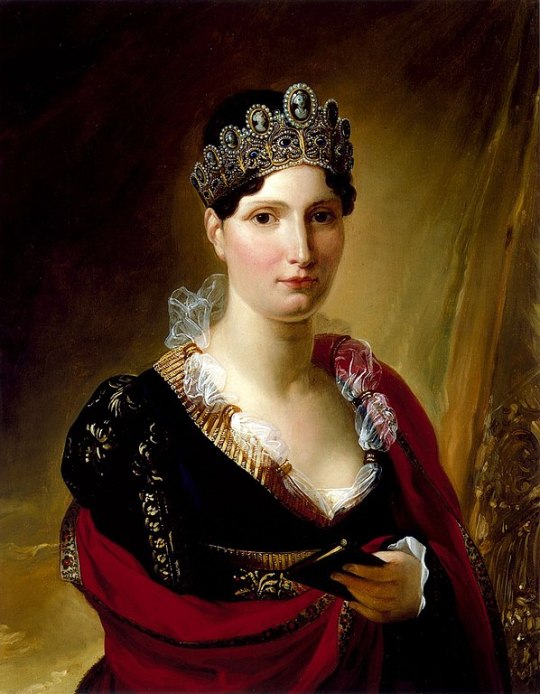
Elisa Bonaparte Baciocchi by Joseph Franque, 1812
Elisa Bonaparte was born on January 3, 1777. She was not as well-known as her sisters, beautiful Pauline and treasonous Caroline, but she was more capable than either of them. In fact, she was the Bonaparte sibling most like Napoleon, although she had the least influence over him. Napoleon himself said, “Elisa has the courage of an Amazon; and like me, she cannot bear to be ruled.” In 1805, he made her the Princess of Piombino and Lucca, where she formed an elaborate court, in imitation of the one in Paris. She took her duties seriously, ruling as a benevolent despot.
Elisa did such a good job that, in 1809, Napoleon made her Grand Duchess of Tuscany, a place she had long had her eye on. She moved her court to the Pitti Palace in Florence, which she refurbished in competition with Caroline’s court in Naples. Elisa's husband, Félix Baciocchi, commanded the local military division under his wife’s supervision. The two lived apart and took lovers.
When Napoleon’s empire began to crumble in 1814, Elisa broke away from her brother, hoping to save her own position. It was no use, as the Tuscans showed no sign of attachment to her and Elisa and Baciocchi had to flee. They tried, unsuccessfully, to make off with the silver and furniture from several of the palaces.
When Napoleon escaped from Elba and returned to France in March of 1815, the Austrians arrested Elisa and imprisoned her. She was released once Napoleon was safely on his way to exile on St. Helena. Elisa was given permission to live in Trieste, where she assumed the title of Countess of Compignano. She died of infection on August 7, 1820, at the age of 43.
When news of Elisa’s death reached Napoleon, he shut himself up alone for several hours. When he emerged, he said, “There is the first member of my family who has set out on the great journey; in a few months I shall go to join her.” He died nine months later, on May 5, 1821.
For more about Elisa, see "Elisa Bonaparte Baciocchi, Napoleon's Capable Sister."
40 notes
·
View notes
Text

Jonah’s Upcoming Projects 🎬
RICH FLU (dir. Galder Gaztelu-Urrutia) - thriller (post-production)
Explores how far people would go to save themselves when the wealth that made the world go round then becomes its most dangerous commodity after a strange disease threatens to kill anyone with any sort of fortune.
A BEAUTIFUL IMPERFECTION (dir. Michiel van Erp) - drama (2024)
🧍♂️Giacomo Casanova
The passionate story of the life and love of Lucia, a renowned veiled courtesan who is the exception to the rule.
FABIO D’ANDREA: ONE SMALL STEP - short (Jonah plays The Astronaut)
WILLIAM TELL (dir. Nick Hamm) - historical film
🧍♂️Rudenz
The film is set in 14th Century Switzerland, where a once peaceful hunter leads his people to rebellion after his family and country are threatened by a tyrannical Austrian King. The year is 1307 and the Holy Roman Empire is crumbling. As its grip on Europe loosens, new dynasties such as the Austrian Habsburg Family encroach on new lands, desperate for power. In Switzerland, the once peaceful country is overwhelmed and bows under the Austrian might as it advances and upends the quiet lives of the Swiss peasants
THE THREESOME (dir. Chad Hartigan) - a romantic comedy (date TBA)
🧍♂️Connor Blake
The movie showcases the story of a boy, Connor, who gradually begins to find his way into a relationship with the girl he’s been in love with his whole life, Olivia. That sounds great and everything, except he’s just had a one-night stand with someone else… and that may complicate things. That’s only the beginning of a complicated yet funny journey that explores trust, responsibility and the true nature of love.
DOCTOR WHO (2025)
🧍♂️Conrad
I KNOW WHAT YOU DID LAST SUMMER (dir. Jennifer Kaytin Robinson) - horror/mystery (the release is set on July 18th 2025)
the reboot of the iconic 90s horror with the new cast Camila Mendes, Madelyn Cline, Sarah Pidgeon, Tyriq Withers, and Jonah Hauer-King. The original film followed four young friends bound by a tragic accident who are reunited when they find themselves being stalked by a hook-wielding maniac. The film became a cult classic, earned over $125 million worldwide and led to the sequel “I Still Know What You Did Last Summer.” Original stars Freddie Prinze Jr. and Jennifer Love Hewitt are in talks to return.
🧍♂️TBA
THE EDEN EXPRESS (dir. Daniel Cockburn)
The film follows Mark Vonnegut’s 1970 quest, alongside his girlfriend Virge and a group of friends. to escape Nixon’s America to find a better way of life on a British Columbia commune. It’s a place they hope will be an “Eden” on Earth. However, as this new utopia comes into focus, Mark starts to hear voices and see visions that give him ominous instructions, marking the start of his journey with bipolar disorder.
🧍♂️ MARK VONNEGUT
#jonah hauer king#british actor#upcoming projects#the tattooist of auschwitz#a beautiful imperfection#rich flu#fabio dandrea#tlm#the little mermaid 2023#ashes in the snow#the song of names#world on fire#little women 2017#agatha and the curse of ishtar#the flatshare#old boys#howards end#the last photograph#postcards from london#i know what you did last summer#doctor who#a dogs way home#my blorbo#jhk the king#jhk
74 notes
·
View notes
Text

From Hamann's Sisi bio - sorry for excess highlights haha but the thing is.
Like wayyyyyy too often the poor relationship between rudolf and valerie gets boiled down to exclusively "he was a BIG SCARY UNSTABLE MAN and she was a poor scared young girl". And while yeah, Rudolf was probably genuinely scarily unstable sometimes, I think it just shows incredible lack of contextual awareness to boil it down to the interpersonal relationship. These people are heads of state (or future heads of state, or in the case of royal women, symbolic representatives of the state), politics are a major aspect of their daily existence and raison d'être!!!
Many of Rudolf's problems were deeply political in nature. If he was a random guy he could have just fucked off and left his family behind, or even changed countries lol, but as the sole heir to the throne he was stuck where he was for all his life, with the systems he placed his faith in and that his personal identity was tied to (the Austrian empire/state, the personal power of the Emperor, the liberal political order...) crumbling.
6 notes
·
View notes
Text
Jonah Hauer-King, Connor Swindells and Ellie Bamber are set to star in ‘WILLIAM TELL’

They are set to star in historical epic William Tell from director Nick Hamm
" the film is set in 14th Century Switzerland, where a once peaceful hunter leads his people to rebellion after his family and country are threatened by a tyrannical Austrian King. The year is 1307 and the Holy Roman Empire is crumbling. As its grip on Europe loosens, new dynasties such as the Austrian Habsburg Family encroach on new lands, desperate for power. In Switzerland, the once peaceful country is overwhelmed and bows under the Austrian might as it advances and upends the quiet lives of the Swiss peasants."
Fun fact:
Jonah Hauer-King - The Little Mermaid - #1 Most Watched Disney Plus

Connor Swindells - Barbie - #1 Top Grossing 2023

Ellie Bamber - Red White and Royal Blue - #1 Most Watched Amazon Prime

They are bagged.
#The Little Mermaid#Barbie#Red White and Royal Blue#jonah hauer king#connor swindells#ellie bamber#they coming for slay cinema#prince eric#princess beatrice#aaron dinkins
14 notes
·
View notes
Text
✌The Rise and Fall of Rene Benko: From Real Estate Mogul to Arrest
Introduction Rene Benko, once heralded as Austria’s self-made billionaire and a titan in European real estate, has seen his empire crumble under the weight of financial and legal scrutiny. On January 23, 2025, Austrian newspapers reported his arrest in his Innsbruck villa, marking a dramatic turn in the saga of his Signa empire. Here, we delve into Benko’s journey, from his entrepreneurial…

View On WordPress
0 notes
Text
Les Misérables is written about three or four different time periods depending on the given chapter and the level on which you're reading it (literally versus historically versus philosophically, etc.). I don't think I appreciated until episode 7.13 of Mike Duncan's Revolutions podcast when he broke down how intensely all of the political factions involved in the 1848 revolutions were influenced by their opinions of the French Revolution, however, how much Les Mis talks about 1848.
I'm gonna be making a post later with a theory about Hugo's characters and structure they pertain to this history and these factions and most especially Cosette's future, but in the meantime, I've transcribed from around 13:10 to nearly the end of the episode so that you all can also appreciate how many levels were involved and have it in writing to refer to and research as you like, because I think it also summarizes pretty well the non-Bonapartist political forces in play at any point in the bricc.
(I also cannot recommend this podcast highly enough for jumping into not just the world of French Revolutions but also Western Revolutions in general.)
So at one end of the spectrum, we have those who looked back at the French Revolution with nothing but horror and disgust and who believed that above all and no matter what the cost, Europe must be kept free of the menace of revolution. But this category of anti-revolutionaries divided up into three broad groups who agreed on practically nothing but the fact that revolution was abhorrent.
First and most obviously, we had the conservative absolutists who returned to power after the Congress of Vienna. The chief leading light of this group was Metternich, and the spectre of the French Revolution haunted no man so much as Metternich. Men like Metternich were so opposed to revolution that they were even opposed to reform. King Louis XVI had invited reform in 1789, and look what had happened to him. So across Europe in 1848 there were conservative writers and members of the clergy and major landowners who believed that you could not even let three guys sit down for a drink or they'd start plotting revolution. You certainly couldn't have a free press. You had to be stubborn, unfair, and ruthless. It was simply too dangerous to be anything less. And this extended to things even as seemingly banal as allowing a kingdom to have a nominal constitution, because in the conservative mind, once you granted the premise that rights came up from the people, rather than down from God through the king, you could just kiss the whole thing goodbye. These conservatives still pined for the days before 1789, and they hated the memory of even the most moderate of French revolutionaries, whose seemingly innocent and earnest appeals for reform had simply been the thin end of the wedge.
But absolutist conservatives were not the only ones who recoiled at the memory of the French Revolution and who wanted to do everything in their power from ever letting it happen again. So this second group of anti-revolutionaries were constitutional liberals who worshiped the rule of law and for whom revolution was anathema to everything they held dear. In France, we would put both Louis Philippe and François Guizot into this category, even if they had oh-so-ironically come to power thanks to the July Revolution [of 1830]. Both men admired the principles that had animated the men of 1789 but who had nonetheless concluded, no less than Metternich, that acquiescing to reform was only the beginning of a very slippery slope. Guizot himself had written a history of France and believed that the king's concessions in the early days of the Estates-General had led directly to the Reign of Terror — and remember, Guizot's father had perished in the Terror, as had King Louis Philippe's [Louis Philippe II, Philippe Égalité]. By the mid-1840s, both men had become stubbornly convinced that everything that needed to be achieved had been achieved and that any further reform would invite that slip into radicalism and the return of Madame la Guillotine. This kind of thinking could also be detected in the minds of rulers over in [modern-day] Germany, where we've discussed that there were these constitutional regimes — Ludwig in Bavaria, Leopold of Baden, and Frederick Augustus in Saxony. Those constitutions existed more as a stopper to prevent revolution than any kind of liberal expressionism.
Finally, there was a third group that cringed at the idea of the French Revolution but who drew the opposite conclusion from Guizot and Metternich: where Guizot and Metternich thought that reform was an invitation to revolution, they felt that reform was a necessary release valve to prevent revolution. So in this category you would find Odilon Barrot and the dynastic left in France who wanted to save the monarchy by reforming the monarchy. You would also find in here a guy like Alexis de Tocqueville, who would go on to write his own book on the French Revolution where he would argue that all of the quote-unquote “gains” of the French Revolution had already started under the Ancien Régime and that basically you didn’t need revolution to change society, you just needed continuous, gradual improvement. We’ve also discussed so far two massively influential reformers in [modern-day] Italy and Hungary who fit this same basic mold. In Italy, we talked about the Count of Cavour in episode 7.09, and in episode 7.08 I introduced István Széchenyi. Both of these guys have broad, sweeping visions for the futures of their respective countries. They believed in liberal constitutional government, economic modernization and social improvement, they simply did not believe revolution was the means of achieving their ends; in fact, this was the very lesson they had drawn from the French Revolution, that the ends had been just, but the means counterproductive. The attempt to cram a century’s worth of work into a single year had not just had disastrous consequences, but they had upset the whole project of reform. I would also throw into this group of anti-revolutionary reformers all of the Austrian liberals in Vienna, who we also talked about in episode 7.08. They believed that the stubborn brittleness of Metternich’s government was inviting a revolutionary upheaval that could be headed off by intelligent and necessary reform.
So those are the guys who desperately wanted to avoid another French Revolution, who instantly shuddered at the idea of ever having something like that happen again. But is that how everyone felt? Oh my goodness, no. There were those who had picked up the thesis of Adolphe Thiers and believed that the revolution of 1789 had been a good thing, a project launched for noble reasons and in fact launched because the existing regime was simply too stubborn to change without revolutionary energy. In this telling, men like Lafayette and Mirabeau were heroes to be emulated while you kept on constant guard against villains like Robespierre and Saint-Just. As you can imagine, this was a very attractive thesis among liberals in Germany and the Austrian empire who saw their own situation as analogous to the Ancien Régime of 1789. Their kingdoms were reeling from an economic crisis, their governments were financially shaky, their natural rights were trampled on by tyrants. So the French Revolutionary project that unfolded between 1789 and 1792 was absolutely a model to be emulated. Bring the liberal, educated intellectuals of the country together and force the kings to grant them a constitution and to guarantee basic civil rights. If they were going to be denied a constitutional place in government, if their local assemblies were going to be neutered, if they were not allowed to vote, if the government was unresponsive, then it was perfectly acceptable to look to 1789 and say, “Yes, we want that too. A moment when men of good will and conscience join together to define the rights of man and the citizen.” Now of course, these neo-1789ers knew the lesson of history well, and they knew that they would need to guard against the villains of 1792, but they did not believe that the Reign of Terror was necessarily inevitable. It had simply happened that way in France thanks to a variety of coincidences, mistakes, and bad luck, so liberals across Europe believed that they could forge constitutional governments that defined civil rights and popular sovereignty without falling prey to the Reign of Terror. Thus, the spectre of the French Revolution would loom very large indeed in the minds of these liberal revolutionaries as the course of 1848 rapidly progressed faster than they could keep up with. As we will see, they will all hit a moment of truth where they have to decide whether to keep pushing and join with more radical forces or quit the whole project, reconcile with the old conservative order, and fight against those radical forces that might lead to the new Reign of Terror.
But there were also those who rejected this whole contrived moralizing of the “good” revolution of 1789 and the “bad” revolution of 1792. They did not recoil from the insurrection of August the 10th, the First French Republic, or the Jacobin Committee of Public Safety. They idolized not the buffoon Lafayette and hypocritical traitor Mirabeau, but rather, the steely resolve of men like Danton and Robespierre and Saint-Just and Marat. These had been men who saw the tyrants of Europe for what they were and knew that one must stand up when the going got tough, not go hide in the corner. These more radical republicans further believed that there was just as much injustice perpetrated by comfortable liberals as conservative absolutists, so they saw the Revolution of 1789 as merely the precursor for the much more important, much more glorious, and much more necessary Revolution of 1792. So though they were enemies of each other, these radicals actually agreed with Metternich that reform really was just the thin edge of the wedge, that it would lead to a greater revolution that would overthrow the despotic monarchies of Europe. In their minds, the widespread slandering of the First French Republic and even the portrayal of the Reign of Terror as the most terrible crime in the history of the world was the nefarious propaganda of the comfortable classes, whether of conservative or liberal stripe. Their propaganda emphasized the dramatic horror of the guillotine in order to cover up the horrors the common people of Europe lived with every day, and the best summation of this argument actually comes from A Connecticut Yankee in King Arthur’s Court, Mark Twain.
Now the book wasn’t published until 1889, but in it, Twain writes a passage that would have had a lot of radicals nodding their heads in 1848. He wrote, “There were two reigns of terror, if we would but remember and consider it. The one wrought murder in hot passion, the other in heartless cold blood. The one lasted mere months, the other had lasted a thousand years. The one inflicted death upon ten thousand persons; the other, upon a hundred million. But our shudders are all for the horrors of the minor terror, the momentary terror so to speak; whereas, what is the horror of the swift ax compared with lifelong death from cold, hunger, insult, cruelty, and heartbreak? What is swift death by lightning compared with death by slow fire at the stake? A city cemetery could contain the coffins filled by that brief terror, which we have all been so diligently taught to shiver at and mourn over. But all France could hardly contain the coffins filled by that older and real terror, that unspeakably bitter and awful terror, which none of us has been taught to see in its vastness or pity as it deserves.”
(Sounds an awful lot like like a certain conversation our favorite bishop has with a certain conventionist, no?)
Now granted, I don’t think many of these radicals were actively pursuing a new Reign of Terror, but they were also not planning to settle for a constitutional monarchy bought by and for the richest families of their country. And as we’ve already seen in France, these guys were not going to let the blood of patriots be spilled simply so they could swap one Bourbon for another and give another hundred thousand bankers and industrialists the right to vote. What in that represented the nation? Where in that were the people? Where was liberty leading the people? Oh right, that painting was locked now in the attic so it did not offend the forces of order. In Italy, these radical republican forces who celebrated 1792 rallied around Giuseppe Mazzini and later Garibaldi; in Hungary they would rally around Lajos Kossuth, and when I get back from the book tour, I will introduce you to the radical leaders in Germany, who would not be satisfied by the mere token reforms promised by men who celebrated 1789 but feared 1792, men like Friedrich Hecker, Robert Blum, and Gustav Struve. Everywhere, they would find their support not solely in the salons and cafés but among artisans and workers and students. Those who would mount the barricades not just for the right to publish an article or to mildly criticize the government or the right to vote if you made a gargantuan amount of money: they fought to topple the king and to bring power to the people — all of the people.
So, so far we have men who idolize the conservatives of 1788, men who idolize the liberal nobles of 1789, and men who idolize the Jacobin republicans of 1792. Well, there was also in 1848 also [sic] now emerging a small clique of men for whom even 1792 was not enough. These guys believed that 1789 had been merely a step to 1792, but also believed that 1792 was simply a step to something greater. So where did these guys look? That’s right: they looked to 1796. “1796?” you say. “ What are you talking about? The Directory? Surely not. Nobody says, ‘Ah, yes, the good old days of the French Directory, let’s definitely go back to that.’” And no, of course I’m not talking about the directory, I’m talking about Gracchus Babeuf and the Conspiracy of Equals. With the small but ever-growing, increasingly influential spirit of socialism and communism beginning to take root, men like Louis Blanc and Karl Marx looked to Babeuf and his gang as the first example of what the force of history was aiming to make of humanity. Communities and nations that shared not just political rights but the wealth of the nation. How indeed are you going to sit back and say, “Ah, yes, the declaration of the rights of man and the citizen, and one citizen should have one vote,” and then call it a day when so few had so much and so many had so little? The vote was nothing to an entire family — dad, mom, children, who were all stuck working eighteen hours a day for starvation wages. It was thus not the spirit of 1789 or the spirit of ‘92 that moved them, but the spirit of 1796; and it was not the name Robespierre that got their hearts thumping, but rather Babeuf. Babeuf had been among the very first of the socialist revolutionaries who had not stopped short at merely answering the political question, but who wanted to answer the social question as well. And as we’ll see as we move further down the road on 1848, that the memory of Gracchus Babeuf was not simply a matter of picking some obscure hero out of the historical record: there was actually a direct line of revolutionary succession, because one of Babeuf’s fellow conspirators in the Conspiracy of Equals was an Italian revolutionary socialist named Phillipe Buonarroti [Filippo Buonarroti]. Buonarroti was in prison but later released and would then go onto a long and active career inside the revolutionary secret societies that sprang up after the Congress of Vienna, and we’re gonna talk more about the role that Buonarroti played in kindling and spreading this revolutionary socialism, but for his small cadre of disciples, the revolutions of 1848 would be a chance not to complete the work of Lafayette in 1789 or Robespierre in 1792, but the work of Babeuf in 1796.
#shitposting @ me#revolutions podcast#les mis#1848 revolutions#yes that's plural revolutions were breaking out fucking everywhere#Christ this took forever to transcribe and link#but also I found it to be such a profoundly helpful summary that I really wanted to make it available to everyone#although I was reminded of exactly how annoyed I was when I first discovered that Mr. Duncan doesn't even type out the names#much less release transcripts of his episodes#Sir I Know You Have Them#You Read From Them For Every Episode It Is Scripted#I Can't Remember Names Without Seeing Them Written#SIR#Italy and Germany didn't exist yet but they sure wanted to#Elisabeth of musical fame was about to make a big splash#the Austrian Empire was crumbling#and France was doing as France does ig#new emperor new me#England managed to avoid this whole mess#which is how in this our Lord's year 2022 they still have a monarchy#(for now)
64 notes
·
View notes
Photo

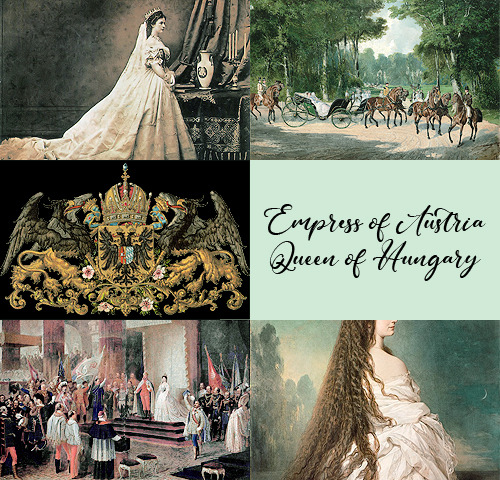
→ Duchess Elisabeth Amalie Eugenie was born in Munich on December 24, 1837, as the fourth child of Duke Maximilian Joseph in Bavaria and Princess Ludovika. Nicknamed Sisi, she enjoyed an informal upbringing before marrying Emperor Franz Joseph I at the age of sixteen. Shy and unsure, Sisi crumbled under the strict court etiquette, which left her isolated and friendless. Her melancholy and distaste for public life was treated as a childish indulgence by her distracted husband and his mother, the formidable Archduchess Sophie. Despite her somber demeanor, Sisi captivated the public thanks to her stunning beauty and ankle-length chestnut hair. Early in her reign, Sisi developed a deep interest in Hungary, then a rebellious part of her husband’s empire. She believed the Hungarian people deserved greater freedoms and respect. In 1867, Hungary became an equal partner in the Austro-Hungarian empire. Franz Joseph was crowned King of Hungary and Sisi became queen - she was beloved by the Hungarian people. The death of Elisabeth’s only son and his mistress Mary Vetsera in a murder–suicide at his hunting lodge at Mayerling in 1889 was a blow from which the Empress never recovered. She withdrew from court duties and travelled widely, unaccompanied by her family. While travelling in Geneva in 1898, Elisabeth was mortally wounded by an Italian anarchist named Luigi Lucheni. Her tenure of 44 years was the longest of any Austrian empress.
260 notes
·
View notes
Text


I decided to answer these questions in one post, I hope it’s okay. :)
So you guys are interested in Austro-Hungarian relations? Oh boy….Do you really want me to recite three books worth of history? Because let me tell you, half the history a normal Hungarian student learns in school is about Austria and us.
Let me summarize our relationship through the ages in a ‘short’ recap:
800-1000: first meetings between the two, Hungary being an invasive threat that had to be stopped
1000-1526: Austrians slowly get used to the Hungarian neighbours, but still see them as a threat to their existence - there is commerce forming between the two though
-1526: the year Austria decides to take claim of whatever is left of Hungary (he has been looking for an opening like that for a few centuries)
-1526-1711: Austria treats Hungary like any other underling of his — at one point (1529) Hungary is ‘kidnapped’ by Turkey but Austria gets her back (1686), Hungary has enough of both him and Turkey though and wants to be free (rebellions)
-1711-1848: Austria is willing to listen more to what Hungary has to say for her rights in the Empire but he refuses to grant many of her wishes (while he also promises lots of things and then goes back on his words) which angers her to the point of declaring independence (48-49 independence war)
-1849-59: Austria takes revenge on Hungary for her deeds with an iron fist, trying to get his control back over her but it only sours the relationship between the two even more
-1859-67: Austria realizes that his crumbling condition as an Empire weakened him and so he has no other choice but to seek a compromise with Hungary (ironically his greatest support in the Empire) so the two form a dual monarchy
-1867-1918: Austro-Hungarian Empire, golden age, cultural exchange, prosperity, etc., Hungarian people slowly warm up to the formerly hated emperor, “the romantic era” (as described by Austrian article)
-1918-1921: first world war, the Empire is unprepared for a modern war and quickly crumbles from the inside, the Entente decides to tear the two apart, Hungary realizes that it is necessary and accepts it (even fights for it) but Austria makes two desperate last ditch attempts to reclaim the Hungarian throne
-1920: Trianon for Hungary, Saint-Germain for Austria — both national traumas - Hungary loses all her former glory and part of her identity while Austria barely makes it out alive (that’s why he wanted to unify with Germany)
-1921-1955: second world war, Anschluss - Germany becomes Hungary’s new neighbour which freaks Hungary out, later Austria becomes neutral in 55 while Hungary gets taken by Soviet Russia
-1955-1989: relations are severed for the most part but Austria tries to help out Hungary in any way he can while still maintaining his neutrality (taking in Hungarian refugees in 1956, also accepting Hungarians who go to get work in Austria)
-1989-today: relations are back on track, social-economical exchanges, the two are very influental to each other in political issues too
Most Hungarians of today have a good opinion on Austria, but watch out because on national Holidays (march 15, oct 6) these same people will hate on Austrians a lot. That’s just how it is: we have a love-hate relationship.
So yes, I also think that he has a face that just demands to be kissed and slapped at the same time. 😂
I personally love the country and it’s people very much! Thanks for the questions! ❤️
#hetalia#hetalia aushun#hetalia austria#hetalia hungary#hws austria#hws hungary#aph austria#aph hungary#aushun#q&a#hungary x country series#zsocca#zsocca55
392 notes
·
View notes
Photo

My attempt at continuing Harry Turtledove's Atlantis Trilogy into the 20th Century, and filling in some of the gaps in the timeline:
BACKGROUND 1812 - The French Revolutionary Wars come to a close with the fall of Paris to Austria. Many attribute the country's defeat to a costly slave revolt turned independence revolution in Santo Tomas. Austria gains dominion over the Rhineland at the Congress of Vienna. 1820 - Mexico gains its independence from Spain, partly due to help from Atlantean volunteers. 1852 - Atlantean Servile Insurrection, known as the Great Insurrection during the Progressive Era. Atlantean slaves successfully defeat the militias of the slave-holding states, and negotiate the manumission of all Atlantean slaves. 1861 - Atlantean Consul Jeremiah Stafford organizes the purchase of Suriname from the Netherlands in what comes to be known as "Stafford's Hothouse" until Gold is discovered there near the end of the Century. 1875- With no end in sight to the Long Depression, the Atlantean government begins a series of National Projects popularly known as Reconstruction. Many of these projects are targeted efforts to improve the economy, but the most significant are political reforms designed to turn Atlantis into a more united nation-state. This includes direct election of Senators, voting rights to non-whites, and the establishment of a professional Army and modern Navy. 1881- After reaching a ceasefire in the Franco-Austrian War, Austria establishes the German Empire under the Hapsburg crown. 1889- Spanish-Atlantean War - After the sinking of the USS Penzance the United States of Atlantis declares war on Spain's crumbling empire. The conflicts serves both to unite the USA a generation after the Atlantean Servile Insurrection, and gives Atlantis dominion over Spain's colonies in the Atlantic. 1905- The first of a series of Canals are dug through Atlantis' central American protectorate. 1910 - The Hapsburg royal family are harassed during a tour of Budapest by a mob of Hungarian Nationalists. The German Empire maintains an unsteady union by plying non-German Kingdoms with tithes. This has soured many Germans on the very idea of Monarchy, and the only thing keeping this Empire together is their mutual loathing for their neighbors. < Previous Map Special thanks to all my supporters on Patreon who helped make this map possible. Patreons get access to all my maps before they go public, along with other exclusive content. www.patreon.com/SeanMcKnight
#alternate history#atlantis#harry turtledove#fan art#fan map#cartography#map#North America#world war 1
20 notes
·
View notes
Text
BLOGTOBER 10/6/2022 - GOLEMANIA! PT 1: DER GOLEM - HOW HE CAME INTO THE WORLD
For Blogtober 10/6 and 10/7, I examined two films about Jewish mysticism, both made by non-Jews, both long unavailable (or simply not available enough), and both fine examples of the style and visual capabilities of their times.
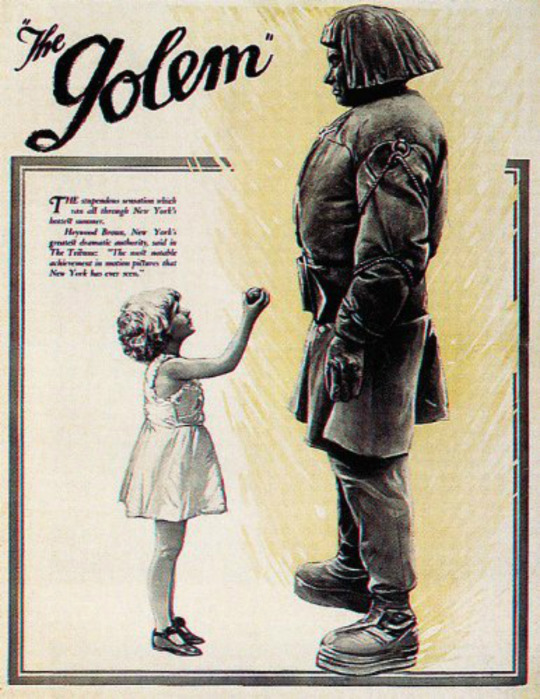
Though THE GOLEM: HOW HE CAME INTO THE WORLD represents an important beat in the development of German expressionist cinema, and any self-respecting nerd has seen plenty of beguiling stills from it, not as many people know it well enough to discuss it on the level that NOSFERATU or THE CABINET OF DR. CALIGARI enjoy. This is surely relatable to availability issues—in fact, the film is part of a trilogy, along with 1915's THE GOLEM and the 1917's THE GOLEM AND THE DANCING GIRL (apparently a primordial example of a horror-comedy!), but these other two are lost to time. The 1920 release, which I'll call DER GOLEM for convenience's sake, is the result of director and star Paul Wegener's desire to update his first effort, which was compromised by a number of disappointing production problems. So, it seems that if we can only have one of his Golem movies, it may as well be this one.
DER GOLEM is the collaboration of writer-director Wegener, his co-writer Henrik Galeen (see also: NOSFERATU), and his co-director Carl Boese, who I assume was especially necessary as Wegener himself plays the title role. The film is adapted from a novel by Austrian author Gustav Myer, which is further based on a Jewish folk tale, and it is interesting to see how this Germanic creative team express their impressions of the history of Jewish persecution. Some critics have found antisemitic underpinnings in the film, largely due to the (delightfully) frightening depiction of the esoteric practice that activates the Golem (which may have a deeper meaning than is immediately apparent), but that would be throwing the baby out with the bathwater. Despite the film being rather brief and broad, it is full of complex, sympathetic characters who transform significantly as the narrative unspools.
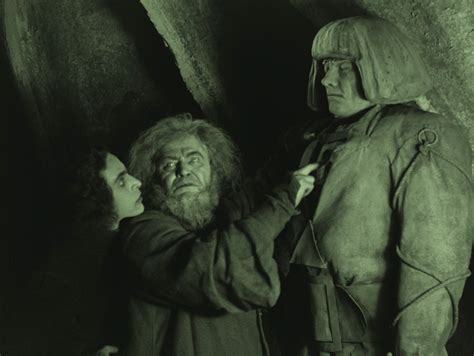
The story takes place in the Jewish ghetto of medieval Prague, where the venerable Rabbi Loew (Albert Steinrück) reads a warning in the stars predicting an imminent danger to his people. Sure enough, an edict comes down from the Holy Roman Emperor (Otto Gebühr) condemning the Jews for their evil character, and ordering their expulsion from the region. Loew creates a hulking clay protector who is brought to life by a sacred word hidden in a star-shaped talisman lodged in his chest, and thinks to impress and entertain the Emperor with his abilities in order to ameliorate the situation. The Golem makes a big splash in the Emperor's court, but the Rabbi's other demonstration doesn't go so well; he implores his audience not to laugh or speak during a magical cinematic projection of the history of the Jewish people, but they can't contain themselves, and the palace begins to crumble. When they are saved by the Golem, the Emperor gratefully rescinds his edict.
Now, this may be enormously crass of me, but I really, deeply think it would be incredibly great if Alamo Drafthouse made one of their pre-show warnings out of this scene. DON'T TALK. DON'T TEXT. OR THE GOLEM WON'T SAVE YOU FROM THE SUPERNATURAL DESTRUCTION OF YOUR EMPIRE.

The other thing I'd like to casually note about this first section, just because it's something I happen to know a little bit about, is that Rabbi Loew's invocation of the goetic demon Astaroth is not really equatable with the idea of devil worship that some viewers have extracted from this—which is fair, because this isn't easy to understand, nor is it readily accessible information. But (and I'm speaking very colloquially here) Astaroth is said to have mastery over esoteric knowledge, and one would work with him in order to gain more occult (for lack of a better word) enlightenment; so, it makes sense that he gives Rabbi Loew the sacred animating word. The other thing about working with demons is that they represent some set of what are usually considered to be negative characteristics: say, slander, wrath, vengeance, etc. So you might work with one of them to deflect these archetypal energies if they are directed at you by someone else. But, you'll also want to be prepared to address these elements in a mature and intelligent way, lest you be overtaken by them yourself. The final effect would be that you've learned an important lesson, and can't be harmed or dominated by whatever malefic characteristic you're dealing with.
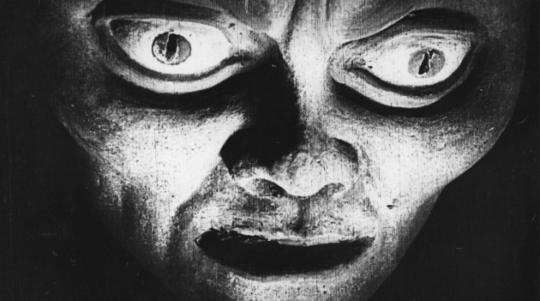
Once the Golem has served its purpose in averting the persecution of the Jews, Loew receives a warning that Astaroth may take it over and use it for vengeful violence. Loew wisely deactivates the creature, but while he goes out to join in communal celebrations, his Assistant makes a big mistake. (The Assistant is played by Ernst Deutsch, a Jewish actor and athlete who I just saw a couple days ago in ISLE OF THE DEAD! I didn't make a note of his wonderful performance as the gently cynical doctor in that film, and now I'm sorry about it) He has fallen in love with the Rabbi's daughter Miriam, and is appalled when he discovers her affair with the Emperor's arrogant squire Florian (Lothar Müthel). The Assistant sets the Golem on Florian, but of course the situation spins out of control, forcing Rabbi Loew to save the community once again.
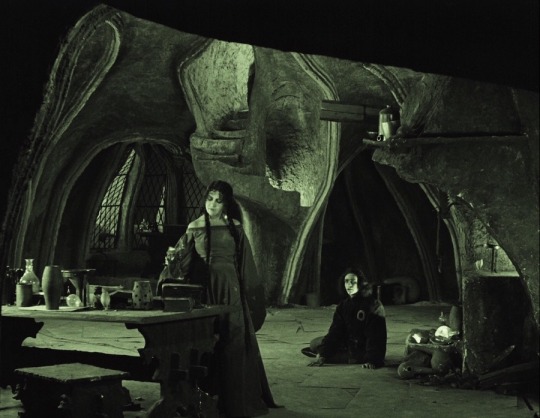
The Golem is an obvious ancestor of Frankenstein's monster, and his misadventure is startlingly similar to that of the better-known creature. Paul Wegener's expressive performance evokes the same range of anger, fear, and naive desire, and his moving interaction with an innocent child is abundantly familiar. In general, DER GOLEM is competitive with FRANKENSTEIN in its emotional complexity; even its villains are tragically human, driven at first by selfish compulsions, but faced with the consequences of their actions, they are sincerely penitent. Even the basics of antisemitism are addressed handily in the film, as the Jews' spartan existence in the ghetto, where their greatest treasures are their traditions and sense of community, flies in the face of the Emperor's accusation that they are avaricious and materialistic. (This coming down from a man bedecked in finery sitting on a gleaming throne, naturally)
The principle gift of DER GOLEM is its advanced aesthetics, owing to the fine work of master cinematographer Karl Freund and architect Hans Poelzig. But the film is bigger than its contributions to film history, telling a sensitive tale that is still surprising in its depth and thoughtfulness. I was glad to see there are new blu ray releases of the film from the last few years, and I'm excited to get my hands on one.
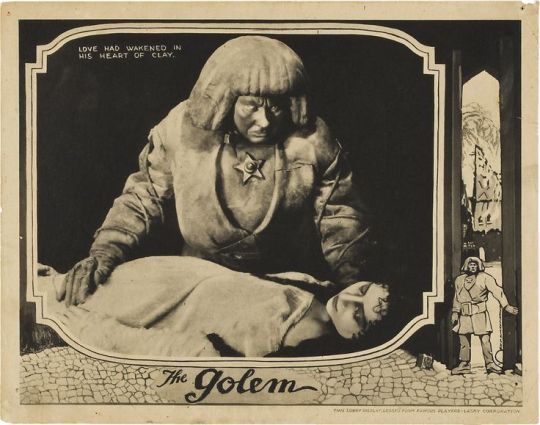
#blogtober#blogtober 2022#golemania#the golem: how he came into the world#der golem: wie er in die Welt kam#paul wegener#carl boese#karl freund#henrik galeen#gustav myer#Albert Steinrück#Otto Gebühr#Ernst Deutsch#Lyda Salmonova#horror#folk horror#german expressionism#hans poelzig#supernatural#occult#esoterism#frankenstein#religion
8 notes
·
View notes
Text
Wait per the census Bohdan is registered in Minsk??? And he has just finished his studies in Krakow??? And you need to renew your registration every...six months, but augh, the name for the registration permit was in German that I read about, so it’s Habsburg rules, and this would be...Russian Empire rules? I came here to learn hot gossip and I am having to navigate the convoluted, byzantine internal bureaucracies of two crumbling imperial powers that partitioned Poland, at the turn of the 20th century, so I can figure out where a civil &/or religious record of a mixed marriage would be officially recorded by Church &/or State between the years of 1909-1912 when one spouse is a Roman Catholic born in the Russian Empire and still, apparently, registered there, though studying and living in Austrian Galicia, and one spouse is an assimilated Jew born in Krakow (Habsburg Empire) who spent her adolescence in Budapest. Empire happens so much
4 notes
·
View notes
Note
So I read the tags in your engbel post and honey you KNOW what I am here for
Please share all of your engbel ;A;
I thought this would be easy but it actually turned out a lot harder than I thought. I hope this delivers on both your and @mr-nauseam's expectations.
1. Many Belgian ports were part of the Hanseatic League, thus though inland Belgium came under heavy French influence, it's great port cities were in contact with English influences as well for hundreds of years before the 16th century. Hence, like Hanover, Belgium was just a girl that Arthur would meet in his travels. Since Arthur tends to be in good moods whenever he's "escaping" from his duties at home and at sea, these interactions were amiable, but not prolonged or particularly memorable (for him).
2. At this point it wasn't entirely clear that Belgium was even a nation, though she certainly wasn't human. I haven't quite decided what she was the representation of, since the low countries were so politically fractured at the time -- perhaps it wasn't obvious to her, either. I like the idea that nations carry a bit of mystery, a seed of the future in their existence.
3. Since she may well have been one of those semi-immortal nations who drift in and out of this world rapidly like a spring breeze, she felt a certain fascination with England, who was older and seemed more sure of himself, rushing around like he always had something to do. She was particularly taken by the fight in him, the way he lived so vibrantly (she was not the first or the last). For her, England and Portugal belonged to a richer, more fast-paced world than the simple, provincial lives she and her brothers led.
4. Everything began to change with the Dutch Revolt. In many ways it and the ensueing 80 years war had the same impact on Belgium's psyche that a civil war would. It was the first time her family, her status quo, her identity were torn apart with breathtaking brutality. She could not quite understand the white-hot fury of her brother with the Spanish, nor could she forgive Spain for treating her own with such violence. Though the southern provinces of Belgica Regia would ultimately remain Spanish, the long, terrible sieges on Antwerp and other cities left her reeling. Britain, despite being offered to rule the United Provinces, remained relatively uninvolved. Still, it was the first time Belgium and her people mattered politically on the international stage, and Arthur would not forget her again.
5. But England remains closer with Netherlands than with Belgium. This would later crop up as a source of doubt between them -- Belgium was somehow too French, even though she often did not want to be, and if France was England's sworn enemy, well -- how could they ever work out? She was "other", and yet she was not. This would somewhat undermine Belgium's confidence later, but this straddling of two worlds actually prompted England's first real curiosity to know her better, though he did not (in typical Arthur fashion) act on it.
6. The next turning point was the French annexation at the end of the 18th century, leading into the Napoleonic Wars. Belgium had endured centuries of conflict, back and forth tug of war, and a bid of independence against the Austrians. She was still not a true nation, but she was no longer a little girl on the docks, either. She had learned to fight, to conceal, to want things for herself. England too was no longer the wild, fierce thing that had once visited her shores. He still had that fight in him -- but the edges had turned bitter, and his eyes held more and more doubts about life than convictions in it. They were no longer young.
7. During the Napoleonic Wars, incidentally, is when Belgium first falls in love. That brilliant red coat, that trim waist and dark eyes -- he had traded his childhood intensity for a different kind: an intensity of hatred, of ambition, of objective. It thrilled her -- perhaps because she too, had tasted the pulse-quickening thrill of war, had glimpsed the glory of empire. His power was attractive in and of itself, and she wanted to be closer it.
8. Being given to her brother she does not appreciate, but by the 1830s she is free. For the next few decades they begin their carefully choreographed romance: a summer spent at his estate as a visiting lady, a trip to the continent to listen for gossip and buy clothes. Arthur, more settled, less wary, indulges in his past curiosity while trying to come to terms with the fact that while he wasn't paying attention, the girl on the docks had acquired a smile that was razor-sharp. They talk, between the carriage rides and evening parties. They talk of their memories, of their friends, of literature and war and philosophy. She keeps up with him on every topic, something he is astonished by.
9. Their relationship crumbles when she acquires an empire of her own. Historically speaking, England begins its most notable period of splendid isolation from 1885, and relations cool when London becomes a centre for resistance against Belgian rule in Congo. Personally speaking, Portugal breaks up with Arthur and he spends the next decade moping like a little bitch, mostly around Paris so he can distract himself with inane drama. Belgium too finds increasingly that she no longer wants a one-sided relationship she isnt sure was love in the first place. The power she was so drawn to in him -- she could have that for herself.
10. The First World War ends all dreams. Despite it all Belgium fights like hell, crops her hair and binds her chest and fights on the front lines. Two years in and England too is worn through with worry, exhaustion, grief. There is no space for glory or pretense anymore. For the first time, perhaps in their entire relationship, they meet each other's eyes as equals and they talk. They ask each other the difficult questions and they do not shy away from the difficult answers. It's a trust that's taken centuries to build, but when the next war comes they don't even need to ask questions anymore. From then on their relationship turns back to idle conversation and coffee dates -- whether it's coffee dates in bombed out cities or among the skyscrapers of the 21st century matters little -- but it's not playing house. Neither wants anything from the other and their curiosity has been satisfied. They simply know each other, and it's enough to be together in that knowledge.
#hws england#hws belgium#engbel#my hcs#it feels like a fic tho my god#you asked for all my engbel and that’s pretty much it#I’m fresh out of engbel
47 notes
·
View notes
Text
(Some) Greek Gods as Historical Figures
So some days ago I secretly logged back into Mythology and Cultures amino and I stumbled across post of casting historical figures as the gods from Greek mythology. Of course, I hated it, so I made my version of this.
Note: Of course, this is going to have quite a lot of Napoleonic figures, since I am more familiar of this period, but please do reblog this post (or tag me on another post) with the hashtag “#mythical figures as historical people” and add some more of your historical figure Greek God fancasts!
Note 2: this post is for entertaining purpose, and just me introducing some guys to y’all and I am not a historian myself and hopefully you all would still like my takes😅
1. Zeus - Louis XIV of France

First and foremost, I shall introduce the king of gods featured in Greco-Roman myths. You may ask, why don’t I cast Henry VIII of England? Well, my reason is very simple: Henry is far from accurate to Zeus in actual myths.
To be honest, Zeus has a more “absolute power” energy in it, and Louis XIV totally has rocked it (like that iconic line “l’état, c’est moi (I am the state)”). Well, Henry also has that kind of energy but everyone only remembers his six wives and the uncountable number of bloodshed (not to mention Catherine of Aragon is a much better fighter than him—got this from Horrible Histories OwO)... Anyways, Louis XVI is basically a Zeus.
2. Hera - Catherine of Aragon

This brings to Catherine of Aragon herself. She’s a total Q U E E N and if you have watched “Six” the musical you already got what I mean (like, being the wife who married to Henry the longest). There’s also the early warlike aspect in Hera (featured in Homer’s works) that Catherine has it as well (at least you know that she’s getting more victories than Henry if you have watched Horrible Histories season 6, in the episode with Rowan Atkinson playing Henry VIII (which is sad because I want Ben Willbond to play him—he iconic to the HH fandom)), making her a great casting of Hera.
Hera, in my opinion, is a very strong woman who has to take Zeus’s shit and I could totally understand why she took revenge on the girls that Zeus has slept with—but anyways, hopefully you guys would like it :3
3. Aphrodite - Pauline Bonaparte
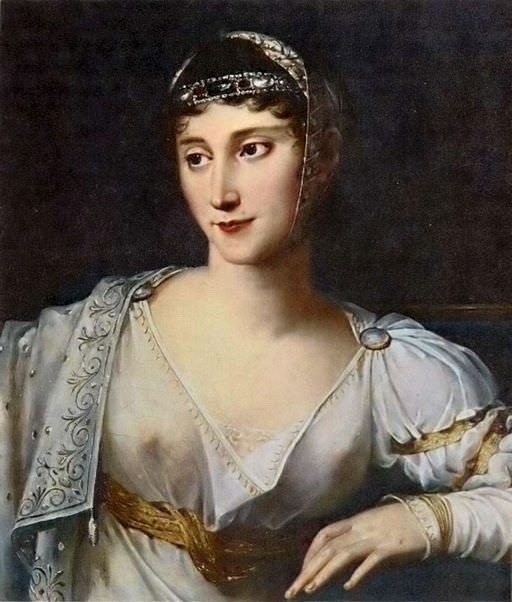
This is half-self-explanatory, really—just look at that statue she posed as Venus, the Roman equivalent of Aphrodite.
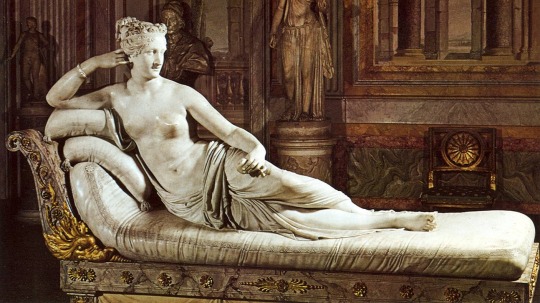
Pauline was famed for her beauty in her time, also a big chunk of scandals from her affairs (which bugs her big brother Napoleon, a lot). Nevertheless, despite her big spending habits and a great sexual appetite, she always helped Napoleon in some surprising ways (like she sold her house in Paris to the Duke of Wellington to get the funds for Napoleon).
Just like Aphrodite herself, Pauline harnessed her beauty very well. Thus, I rest my case.
4. Apollo - Joachim Murat or Emperor Franz Joseph I of Austria
(Warning: long content ahead)
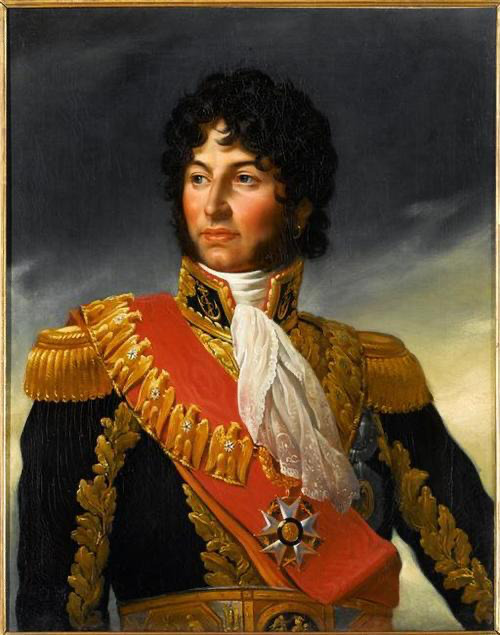
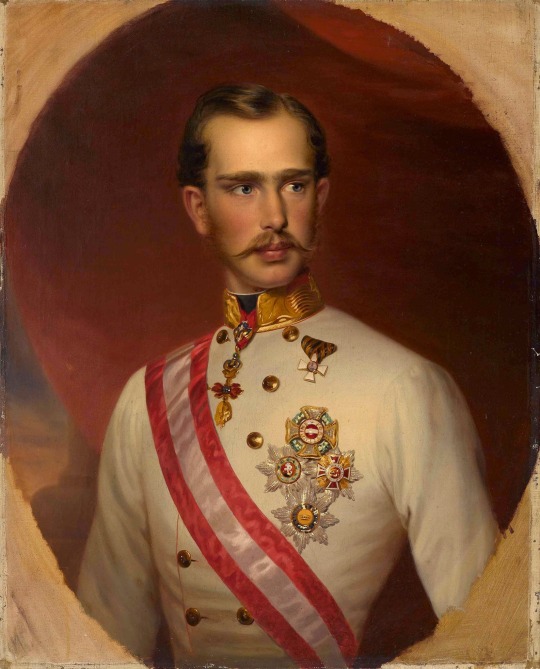
Firstly, let me briefly introduce them because you guys might not know them much.
Joachim Murat was a marshal of France, also one of Napoleon’s brother-in-law, grand duke of Berg and Cleves from 1806 to 1808 and the King of Naples from 1808 to 1815. After the wars, he attempted to escape yet was caught and executed in 1815 in Pizzo, Italy (if you have read of Alexandre Dumas’s “Famous Crimes” you might know him—by the way no one has cut his head off and sent it to that big nose King Ferdinand).
For those who have watched “Elisabeth” or the “Sissi” movies, you might know Franz Joseph I of Austria already but you might not know much about himself besides being the husband of the (in)famous Empress Sisi (ie. Empress Elisabeth of Austria). He was the Emperor of the Austria from 1848 to his death in 1916—one of the longest reigning European monarchs in history. During his reign, the empire had been through a lot of change, most notably, the creation of Austria-Hungary. Nevertheless, he was also the Emperor who started World War I and he died of old age in the midst of the Great War.
For Apollo, I’m not casting musicians because this is quite overdone. I rather want to shed a light to the other arts that he represented in Greco-Roman mythology. This makes me want to draw a parallel to Joachim Murat as he was also a great sucker of classical literature. Plus, he also was known to be a flamboyant dresser (his nickname was “the Dandy King” by the way), also the designer of the uniforms of the Neapolitan army (with an excessive amount of amaranth, perhaps his favourite colour). Really, everyone just sees him as a great flamboyant himbo but in reality, he’s iconically badass in the battlefield as the First Horseman of Europe. Well, also he’s known for being extremely good with women even though his wife Caroline was fierce as hell. So, in my opinion, he fits the image of Apollo that we know.
However, you guys might feel surprised why I picked Franz Joseph for Apollo. Well, he really... was a rather mediocre ruler in my opinion, and perhaps our most memorable image of him was the senile emperor who signed the declaration of war to Serbia. Nevertheless, he was a well-liked man among his subjects, at least to some old citizens of Austria-Hungary telling future generations. Besides, culture flourished in Vienna under his reign—with notable figures like Sigmund Freud, Ludwig Wittgenstein and Erwin Schrödinger. Despite the series of unfortunate events which made the empire started to crumble, Austria-Hungary arguably has its cultural importance in Europe. Sounds like what Apollo would do if he’s a ruler, somehow.
Well, enough of his political achievements, let’s talk about his private life... which was probably the actual reason why I picked him.
Enter Duchess Elisabeth in Bavaria, the Empress of Austria and Queen of Hungary, also known as Sisi.
On a side note, Marshal Louis-Alexandre Berthier of France, Prince of Neufchâtel and of Wargram, was Empress Sisi’s grand-uncle in-law via his marriage to Duchess Maria Elisabeth in Bavaria

Absolutely love Pia as Elisabeth in the musical so please don’t mind me using a gif from this :3 ((also, “Elisabeth” spoiler alert
Franz originally was to marry her sister Helene (nicknamed Néné), nevertheless, on the first meeting in Bad Ishl, he has fallen for the young Elisabeth, head over heels—making him defying his domineering mother, Archduchess Sophie, for the very first time. Elisabeth also liked him and did not expressed her refusal either, so they got married in St. Augustine’s Church in 29th April, 1854.
However, the marriage was not well. Sisi was not accustomed to the strict Austrian court especially Archduchess Sophie (also she was not really a fan of intimacy). Poor Franz was rather helpless in situations between his mother and his wife, and eventually, Sisi chose her freedom over her duty as Empress, traveling around the world. They two briefly went back together during the Austro-Hungarian compromise, yet she was constantly not there. Eventually, Sisi was assassinated by an anarchist named Luigi Lucheni during her stay in Geneva, Switzerland, and Franz was devastated over her death (“she will never know how much I love her”).
To Franz, he loved her so, but he really didn’t understand her needs. Even though he had countless mistresses and female companions in Vienna, he still missed his wife. I say, he was really unlucky when it comes to love. Like Apollo himself, he dated countless nymphs and humans, but a lot of his notable relationships did not have a good end. (Probably Cyrene was the most lucky one, yet she also has chosen to be left alone after mothering several children with Apollo.) For this, I picked Franz Joseph as Apollo.
5. Ares - Jean Lannes or Michel Ney
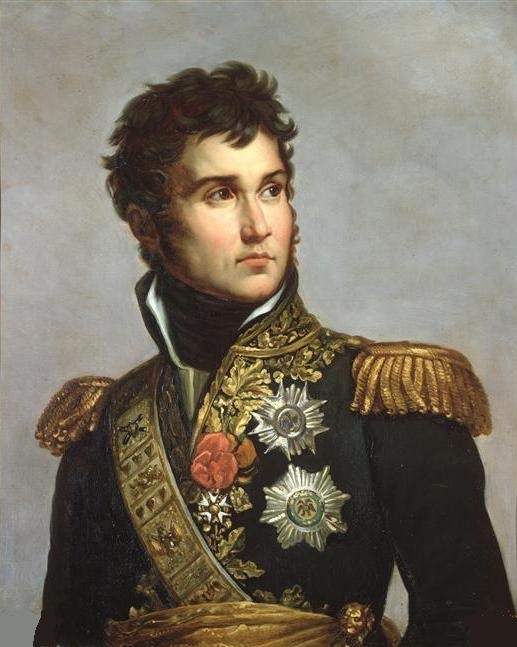
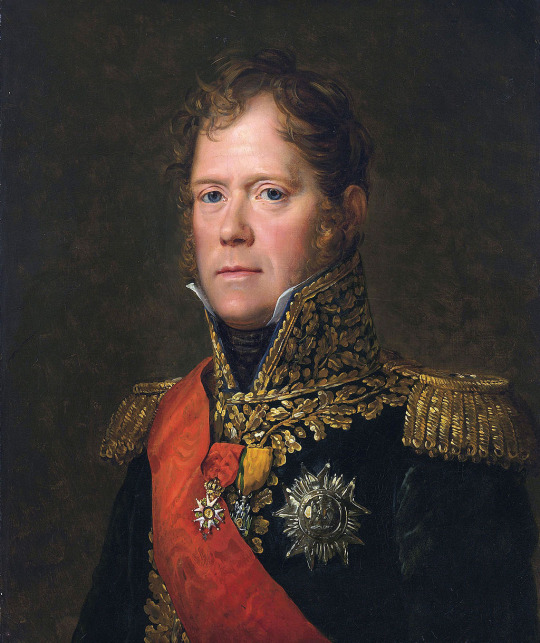
As usual, for those who don’t know much history, I shall briefly introduce my babeys these two great soldiers.
Jean Lannes was one of the marshals of Napoleon, known for being one of Napoleon’s closest friends and his fiery personality, and is considered one of the best marshals of the 1st French Empire. His finest moments including the Battle of Ratisbon in which he led his men to storm the well-guarded city with ladders (hence his nickname “ladder lord” in our very humble Napoleonic marshalate fandom :3). Sadly, he died of the wound he received in the battle of Aspern-Essling in 1809.
Michel Ney was also one of the marshals of Napoleon, known for his extreme valour (yep, he is known as the “Bravest of the Brave”). As you might know, he was one of the marshals who was in Waterloo, yet, his finest hour was during the retreat from Russia in the disasterous 1812. Sadly, he was arguably the most prominent victim of the White Terror under the second Bourbon restoration, executed in 1815 (**I am not accepting any kind of conspiracy theories of my babey survived and died in America😤).
Speaking of Ares, I have a lot of things to say (that’s my dad ;-; no jkjk). He is really not that bloodthirsty idiot who casually hates humans. Well, he’s more like a fiery dork and a man who was very faithful to his lovers, and fights very well (by the way also one of the best dads). So, the bois that come into my mind are automatically two of the most courageous marshals of France.
Lannes, if I have to get him a godly parent, it would definitely Ares. He resembled the god a lot (also I sometimes imagined Ares as a smol bean with dark hair), probably looks the most like Ares himself. He got that fiery temper, that faithfulness to his wife Louise, also being a very courageous fighter in the field—well he literally was like, “NO LEMME STORM DAT CITY *grabs ladder*”.

There you have it, my big bro our ladder lord Jean Lannes who can pull off a perfect Ares.
Ney is like a slightly introverted (and mature) version of an Ares person. You can guess his temper already through his famed auburn hair, and indeed despite his shy exterior his temper sometimes was a bit explosive, and a bit impatient (which was somehow one of his fatal flaws). He was a great fighter, known as a skilled swordsman in his youth. And you all know how brave he is in his famed epithet. Michel Ney is purely badass (and C U T E) you know (and he needs a lot of hugs because he has really been though a lot in the wars, and was a possible case of PTSD which was shown in his arguably suicidal behaviour during the battle of Waterloo). That’s why I casted him as the Greek god Ares OwO
//
And there you have it, my interpretations on the Greek gods via people in history. I originally would like to include more but somehow I realised that I have written too much about my picks. So, if you want to add more, reblog this post or tag me on the post you made on this topic (and please use the hashtag “mythical figures as historical people” so that I could look into your choices via the search bubble on this app🥺).
Last but not the least, I hope you all lovelies like this, also have learnt something new via my brief introductions on some historical people. Have a great day!
#greek mythology#finally some Greek mythology content#i hope you all don’t mind me overselling my bois#no shipping intended on the castings#this is from an ex-Hellenic devotee who had been in Classics class#Zeus#Hera#Aphrodite#Apollo#Ares#methods of procrastinating from university tasks and responsibilities#why am I still up in 2am I said I would get a proper sleep tonight for excessive headbanging to David Bowie for his birthday🌚#the relationship between Franz and Sisi got me sobbing all the time#Louis XIV#Catherine of Aragon#pauline bonaparte#joachim murat#franz joseph i#elisabeth of austria#elisabeth of bavaria#empress sisi#jean lannes#michel ney#mythical figures as historical people
93 notes
·
View notes